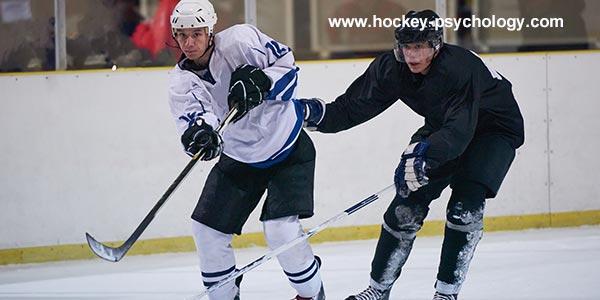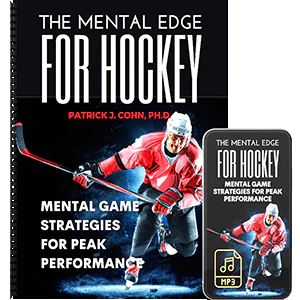
Hutchinson’s Consistency Leads Him Back to NHL
The hallmarks of success are peak performance and consistency.
While any hockey player can have a great game once in a while, it’s performing at your peak on a consistent basis that most hockey players struggle with achieving.
Being consistent is a hot topic from hockey players that have responded to our Mental Game of Hockey Survey. One high school hockey player asked for help with being consistent throughout the season:
“How do I be more consistent in games? I seem to be all over the place, not just from game to game but also shift to shift. It is frustrating because I know I have the ability but I just can’t piece games together.”
One frustrating component to inconsistency is that you never know which athlete is going to show up.
Some games you feel excited, confident and ready to go. You hit the ice and have a great game.
Other days, you feel unsure or tired. Pregame warm up feels uneasy and anxious. When the game begins, you start off strong but one bad pass sends you spiraling downward.
The issue with consistency is how you define consistency. If you define consistency in unrealistic terms then consistency will feel elusive.
Some Misconceptions About Consistency Include:
Consistency means perfection. “I can’t make any turnovers.”
Consistency means playing being on top of your game every game. “I must have my ‘A’ game, every game.”
Consistency means matching your statistic every game. “I need two assists every game.”
Too many circumstances are beyond your control to achieve certain outcomes or standards every game. Unlucky bounces, the play from the opposing team, the lineup and how your team plays as a unit all have an impact upon the game.
Trying to control the uncontrollable builds anxiety and further knocks you off your game.
Outcomes are not the best judge of performance all the time. The true measure of consistency is how you played in terms of effort and focus.
You achieve consistency in effort and focus by being consistent in your approach and preparation for each game.
For example, Toronto Maple Leaf goaltender Michael Hutchinson has battled consistency problems. Hutchinson started the 2019-20 season on Toronto’s NHL roster, was waived early in the season, cleared waivers the next day, was loaned to the AHL Toronto Marlies and is back with the Leafs as the team makes a push for the playoffs.
Hutchinson has been trying to find the consistency necessary to thrive in the NHL. Hutchinson turned to the mental side of the sport and maintains the same mental approach to each game to achieve consistency in his game.
HUTCHINSON: “Being relaxed and clear-headed and just kind of letting the game come to me is the biggest thing. Approach it the way I have the last few games and hopefully everything works out.”
To achieve consistency, you need to redefine consistency in realistic, personal terms. Once you define consistency, you can identify effective strategies to mentally approach and prepare for competition.
Building Consistency
Define consistency in terms that make sense for you personally. What would consistency look like for you? How will you objectively evaluate your performance according to your definition of consistency?
We know that consistent mental and physical preparation leads to consistent performance. How will you prepare consistently?
Consistency starts well before game-time. You have to prepare your body and mind using your pregame warm up…
Think about the level of intensity that you need to perform well. Do you need to feel pumped up or do you need to relax? You control this.
What about your level of confidence? Do you play your best when you go into each game with confidence? You can control your confidence too. You want to enter each game with focus, confidence, trust, and composure.
Related Articles on Hockey Mental Game:
- The Key to Consistency in Hockey
- Improve Consistency With Mental Training
- How to Not Panic During Hockey Games
*Subscribe to The Sports Psychology Podcast on iTunes
*Subscribe to The Sports Psychology Podcast on Spotify
The Mental Edge for Hockey

The Mental Edge for Hockey teaches you proven and simple mental game strategies so you can overcome fear of failure, lack of confidence, slumps or poor composure, take your practice game to competition, and boost your confidence in hockey. You learn simple, actionable mental game strategies to help you perform at your peak!
I’ve worked with athletes for 30 plus years – and know the top challenges that undermine performance when you perform in games. Now you can tap into my expertise and experience in coaching hockey players on the mental game.
In this program, you’ll learn the TOP 10 mental training lessons for hockey players – the same strategies I teach one-on-one athletes I coach on the mental game. My clients pay thousands of dollars for personal coaching, but now you can have the same strategies to improve your mental game – at a fraction of the price.
Leave a Reply